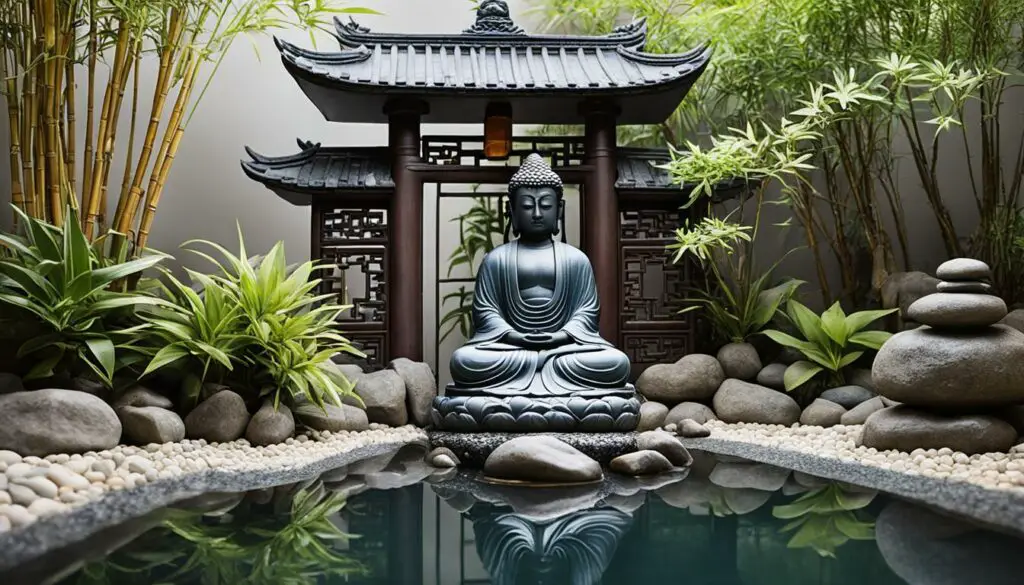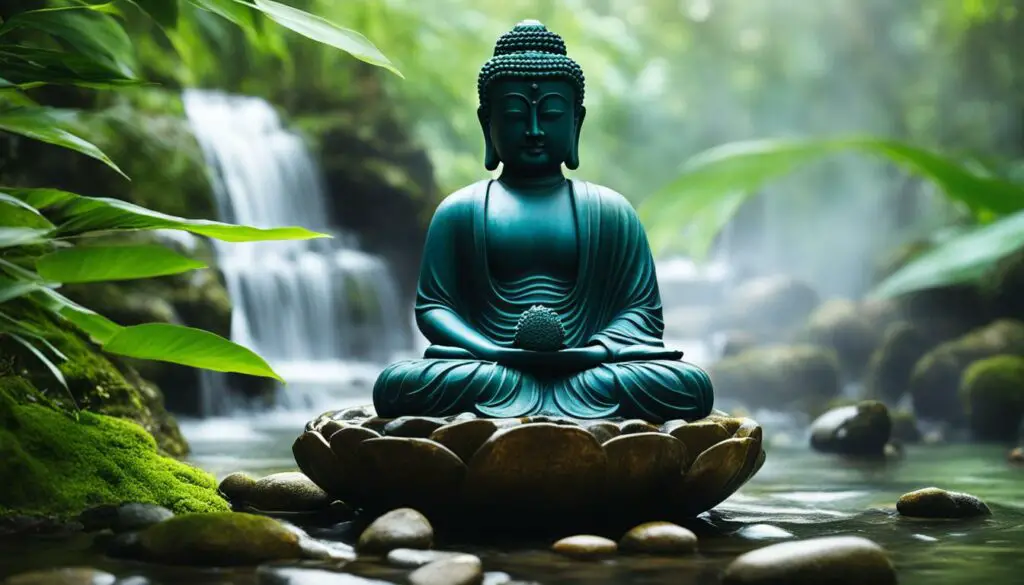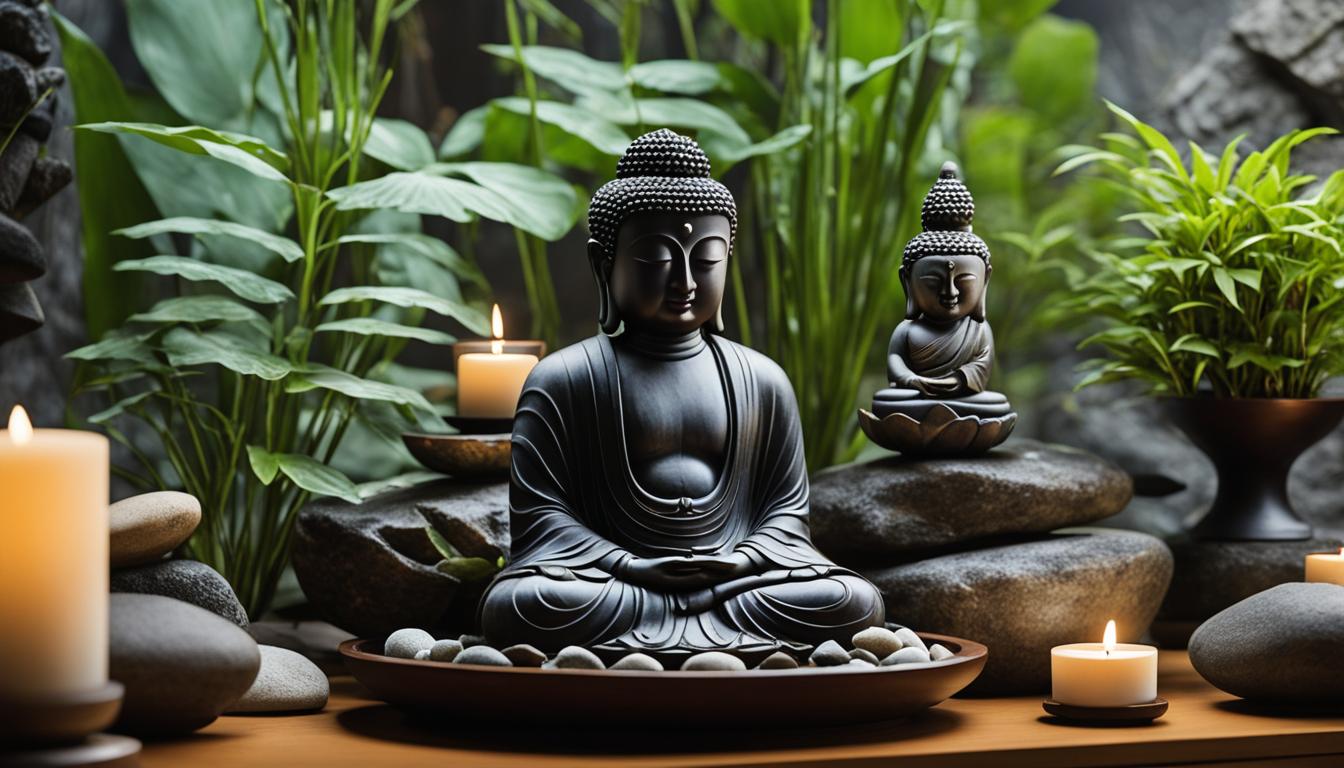When it comes to the practice of feng shui, many people wonder if Buddhists believe in it. The relationship between feng shui and Buddhism is an intriguing topic that requires exploration. While feng shui is not inherently a Buddhist practice, it does have connections and variations within Buddhist communities and traditions.
Feng shui, an ancient Chinese practice, involves creating harmony and balance in one’s physical environment. While some Buddhists do practice feng shui, it is important to note that classical feng shui, which focuses on balancing energies using the five elements, does not involve religious symbols. Rather, the integration of feng shui with Buddhism depends on individual beliefs and interpretations.
Key Takeaways:
- While feng shui is not a strictly Buddhist practice, some Buddhists do incorporate it into their spiritual lives.
- Feng shui focuses on creating harmony and balance in one’s physical environment.
- Classical feng shui does not involve religious symbols, but its compatibility with Buddhism varies among practitioners.
- Integration of feng shui with Buddhism is a personal choice influenced by individual beliefs and cultural backgrounds.
- Feng shui can support spiritual well-being and personal growth for some Buddhists.
What is Feng Shui?

Feng shui is an ancient Chinese practice that involves arranging the physical environment to create harmony and balance. In Buddhism, feng shui is often used to enhance the energy of a space and promote spiritual well-being. It focuses on the use of the five elements (water, wood, fire, earth, and metal) to bring the energies into balance. Buddhists may use feng shui principles in their homes, temples, or meditation spaces to align with their spiritual beliefs and create a conducive environment for practice.
Feng shui practices in Buddhism revolve around the principles of energy flow and mindfulness. By arranging objects, furniture, and elements in a specific way, Buddhists aim to cultivate positive energy and create a harmonious space that supports their spiritual journey. In feng shui, each element represents a different aspect of life, and the correct placement and balance of these elements can enhance specific areas such as health, wealth, and relationships.
One of the fundamental principles in feng shui is the concept of “qi” or life force energy. Buddhists believe that this energy flows through everything and has a direct impact on our well-being. By implementing feng shui principles, Buddhists aim to create an environment that allows the free and balanced flow of qi, supporting their spiritual practices and promoting overall harmony.
The Five Elements in Feng Shui
The five elements, namely water, wood, fire, earth, and metal, play a significant role in feng shui practices for Buddhists. Each element represents different qualities and characteristics, and the combination and balance of these elements create a harmonious environment. Here is a breakdown of the five elements and their corresponding qualities:
- Water: Represents wisdom, flow, and calmness. It is associated with the colors blue and black.
- Wood: Symbolizes growth, vitality, and new beginnings. It is associated with the colors green and brown.
- Fire: Represents passion, inspiration, and transformation. It is associated with the colors red, orange, and purple.
- Earth: Symbolizes stability, grounding, and nourishment. It is associated with the colors yellow and earth tones.
- Metal: Represents clarity, strength, and efficiency. It is associated with the colors white, gray, and metallic tones.
Feng Shui Principles for Buddhists
When applying feng shui principles in their homes or sacred spaces, Buddhists consider the following aspects:
- Clutter-free environment: Buddhists aim to create a clean and clutter-free environment to allow the free flow of energy and promote mental clarity.
- Balance and harmony: Buddhists strive for a balanced arrangement of objects and elements to create a harmonious space that supports their meditation and spiritual practices.
- Alignment with nature: Buddhists incorporate natural materials, colors, and elements to create a space that aligns with the natural world, promoting a sense of peace and connection.
- Awareness of symbolism: Buddhists are mindful of the symbols and representations used in their feng shui practices, choosing objects and decor that hold significance in Buddhist philosophy.
Overall, feng shui practices in Buddhism aim to create an environment that supports spiritual growth, mindfulness, and well-being. By aligning with the principles of feng shui, Buddhists seek to cultivate a space that enhances their practice and nurtures their connection to the teachings of Buddhism.
| Benefits of Feng Shui for Buddhists |
|---|
| 1. Enhanced spiritual well-being |
| 2. Improved energy flow in living spaces |
| 3. Increased mindfulness and focus during meditation |
| 4. Promoted harmony and balance in daily life |
| 5. Support for personal growth and self-improvement |
The Role of Mantras in Feng Shui

In BTB Feng Shui, which stands for Black Sect Tibetan Buddhism, mantras play a significant role in enhancing the effects of feng shui practices. Mantras are sacred sounds or chants that hold powerful vibrations and are believed to connect practitioners with the divine energy of the universe.
The Buddhist mantra “om mani padme hum” is commonly used in BTB Feng Shui to reinforce the positive energy and intentions set in feng shui practices. This mantra represents compassion and invokes the presence of Chenrezig, the Buddha of Compassion.
By incorporating mantras into feng shui, practitioners aim to deepen their spiritual connection and enhance the harmonizing effects of feng shui cures and ceremonies.
The Historical Context of Feng Shui in Buddhism
The origins of feng shui can be traced back to ancient Chinese philosophy and traditional Chinese culture. While feng shui is not inherently a Buddhist practice, it has become intertwined with Buddhism over time. In fact, some of the principles and concepts of feng shui can be found in Buddhist teachings. The integration of feng shui into Buddhism can be seen in various historical texts and practices. The compatibility and acceptance of feng shui within the Buddhist community may vary depending on cultural contexts and individual interpretations.
Feng Shui as a Cultural Tradition

Feng shui, deeply rooted in various Asian cultural traditions, has gained significant prominence in Buddhism. This ancient practice is widely used as a tool to enhance the spiritual and physical well-being of individuals and communities alike. Within Buddhist traditions, feng shui often plays a role in selecting auspicious locations for temples, monasteries, and burial grounds. By aligning with the principles of feng shui, practitioners aim to create a harmonious and supportive environment conducive to spiritual growth and enlightenment.
| Buddhist Traditions | Feng Shui Concepts |
|---|---|
| Use of feng shui to select auspicious temple locations | Harmonizing spiritual energy in sacred spaces |
| Integration of feng shui in monastery design | Creating a supportive environment for spiritual practice |
| Feng shui principles in selecting burial grounds | Fostering positive energy for deceased individuals |
Feng shui, with its rich cultural significance, has become an integral aspect of Buddhist traditions, offering practitioners a means to optimize their spiritual experiences and foster a deep connection to their surroundings.
Influence of Feng Shui on Personal Well-being

Many Buddhists embrace the practice of feng shui to enhance their personal well-being. By incorporating feng shui principles into their living spaces, individuals can create an environment that fosters balance, tranquility, and positive energy.
Applying feng shui principles can have a profound impact on one’s mental and emotional state, supporting meditation and mindfulness practices. By creating a harmonious living space, individuals can find it easier to cultivate inner peace and clarity.
Feng shui serves as a complementary practice to Buddhism, offering practical tools to create a conducive environment for spiritual growth and self-improvement. When combined with Buddhist principles, feng shui can further enhance the overall well-being of practitioners.
Creating a harmonious environment that aligns with feng shui principles can contribute to a sense of well-being and connection with the surrounding energies. This can ultimately enhance one’s spiritual journey within the context of Buddhism.
Integrating feng shui practices into daily life can have a positive impact on various aspects, including physical, mental, and emotional well-being. It can bring about a greater sense of balance, increased focus, and a deeper connection with one’s surroundings.
“By aligning our physical spaces with feng shui principles, we create an environment that supports our spiritual practice and personal growth.”
The Benefits of Feng Shui in Buddhism:
- Enhanced sense of harmony
- Promotes tranquility and peace of mind
- Supports meditation and mindfulness practices
- Creates a positive and energizing atmosphere
- Enhances overall well-being and personal growth
Integrating feng shui practices into Buddhist traditions can deepen the spiritual experience and contribute to a more fulfilling and balanced life. By embracing feng shui, Buddhists can create an environment that aligns with their beliefs and nurtures their spiritual practice.
| Feng Shui Practices in Buddhism | Feng Shui Principles for Buddhists |
|---|---|
| Arranging the living space to promote positive energy flow | Creating a conducive environment for meditation |
| Using colors and natural elements to harmonize the space | Enhancing the spiritual atmosphere of temples and meditation halls |
| Choosing auspicious locations for Buddhist rituals | Aligning with the principles of balance and harmony |
| Placing sacred objects to cultivate a sense of reverence | Fostering a deep connection with the surrounding energies |
Exploring the Philosophy and Science of Feng Shui

While feng shui is often associated with cultural and spiritual beliefs, it also encompasses a scientific aspect. The principles of feng shui are rooted in the observation of natural and environmental phenomena, as well as the understanding of energy flow. This scientific foundation aligns harmoniously with the Buddhist philosophy of interconnectedness and the impermanence of all things.
Feng shui practices in Buddhism allow practitioners to delve deeper into the interplay between the physical and energetic aspects of their surroundings. By incorporating feng shui principles, Buddhists gain an enhanced understanding of the vital role environment plays in promoting harmony and well-being.
The belief in feng shui in Buddhism centers around the desired balance and alignment of energies in both indoor and outdoor spaces. This alignment is believed to nurture positive energy and create an environment conducive to spiritual growth and peacefulness.
Interconnectedness of Feng Shui and Buddhism
“Feng shui teaches us that our environment is not separate from ourselves but an integral part of our overall well-being. This concept aligns closely with Buddhist teachings on the interconnectedness of all things.” – Buddhist Teacher
Buddhism emphasizes the unity and connectedness of all beings and elements in the universe. This view is reflected in feng shui, where the organization and arrangement of physical spaces are believed to impact the flow of energy and influence human experiences.
The philosophical synergy between feng shui and Buddhism lies in their shared understanding of the interdependence and interconnectedness of all aspects of existence. Both systems recognize that external surroundings have the power to influence internal states of being, whether in terms of mental clarity, emotional equilibrium, or spiritual resonance.
The Concept of Impermanence
“Feng shui reminds us that change is inevitable and that our surroundings are constantly evolving. Embracing impermanence allows us to adapt and create spaces that support our well-being.” – Feng Shui Master
The Buddhist principle of impermanence or “anicca” underscores the transient nature of all things. In feng shui, this concept is reflected in the acknowledgment that energy and environments are constantly shifting and changing. By recognizing and embracing impermanence, practitioners of feng shui and Buddhism can make intentional adjustments to create and maintain balance in their surroundings.
Applying the Science and Philosophy
The combination of feng shui’s scientific observations and Buddhist philosophy holds immense potential for those seeking to enhance their spiritual practice and well-being. By mindfully utilizing the principles of feng shui, Buddhists can create spaces that support their meditation, promote positive energy flow, and encourage a sense of tranquility.
Through awareness of the physical and energetic aspects of their environment, Buddhists can deepen their understanding of impermanence and interconnectedness. This integration of feng shui into Buddhist practice fosters a profound appreciation for the impactful relationship between individuals and their surroundings.
The Importance of Personal Interpretation
Beliefs and practices related to feng shui can vary among Buddhists, highlighting the importance of personal interpretation. Buddhism encourages individuals to have their own unique experiences and understandings of the teachings, including the integration of feng shui into their lives.
For some Buddhists, feng shui serves as a valuable tool for creating balance and harmony in daily life. They may find value in the concepts and methods of feng shui, using them to cultivate a sense of well-being and alignment with their spiritual beliefs. By applying feng shui principles to their living spaces, they strive to create an environment that supports their spiritual practice.
On the other hand, some Buddhists may not resonate with the concepts or methods of feng shui. They may have different perspectives on how to find balance and harmony in their lives, relying more on meditation, mindfulness, or other Buddhist practices. Each individual’s spiritual journey is unique, influenced by their own beliefs, cultural background, and personal experiences.
Ultimately, the decision to incorporate feng shui into Buddhist practice is a personal one. There is no right or wrong approach, as Buddhism allows for diverse interpretations and practices. The compatibility between feng shui and Buddhism can vary among individuals and communities, reflecting the richness and flexibility of Buddhist philosophy.
Quotes:
“Personal interpretation is at the heart of Buddhist practice, and the integration of feng shui is no exception. It is through this personal exploration and understanding that we can truly connect with the teachings and find our own path to spiritual growth.” – Lama Tenzin Rinpoche
Comparative Beliefs and Practices
| Buddhist Perspective on Feng Shui | View on Feng Shui |
|---|---|
| Some Buddhists find value in utilizing feng shui as a tool for creating balance and harmony in their lives. | Positive |
| Some Buddhists do not resonate with the concepts or methods of feng shui. | Neutral |
| The integration of feng shui with Buddhism is a personal choice influenced by individual beliefs, cultural background, and spiritual journey. | Varies |
It is crucial to respect and honor the diversity of beliefs and practices within Buddhism. Personal interpretations of feng shui play a significant role in the spiritual journey of Buddhists, allowing for individual expression and growth in accordance with their unique path.
Conclusion
Feng shui teachings have become an integral part of Buddhist cultural traditions, as some Buddhists incorporate its principles and practices into their spiritual lives. While feng shui is not inherently a religious practice, it serves as a valuable tool for creating harmony, balance, and positive energy in living spaces and sacred environments.
The integration of feng shui with Buddhism is a personal choice that varies among individuals and communities. While some Buddhists find value in utilizing feng shui to align with their spiritual beliefs and enhance their well-being, others may not resonate with its concepts or methods.
Ultimately, the compatibility and beliefs regarding feng shui within Buddhism can vary. Despite this, feng shui remains a practice that some Buddhists find beneficial for creating a conducive environment for their spiritual growth and overall spiritual well-being.
FAQ
Do Buddhists believe in feng shui?
While feng shui is not inherently a Buddhist practice, some Buddhists do believe in and practice feng shui.
What is feng shui?
Feng shui is an ancient Chinese practice that involves arranging the physical environment to create harmony and balance. Buddhists may use feng shui principles in their homes, temples, or meditation spaces to align with their spiritual beliefs and create a conducive environment for practice.
What is the role of mantras in feng shui?
In BTB Feng Shui, mantras are frequently used to enhance the effects of feng shui cures and ceremonies. The Buddhist mantra “om mani padme hum” is commonly used in BTB Feng Shui to reinforce positive energy and intentions.
What is the historical context of feng shui in Buddhism?
While feng shui is not inherently a Buddhist practice, it has become intertwined with Buddhism over time. The integration of feng shui into Buddhism can be seen in various historical texts and practices.
How is feng shui viewed as a cultural tradition in Buddhism?
Feng shui has become deeply rooted in various Asian cultural traditions, including Buddhism. It is often used to select auspicious locations for temples, monasteries, and burial grounds in Buddhist traditions.
How does feng shui influence personal well-being in Buddhism?
Some Buddhists incorporate feng shui practices into their daily lives to improve their personal well-being. By applying feng shui principles, individuals can create a sense of balance, tranquility, and positive energy.
What is the philosophy and science behind feng shui?
Feng shui principles are based on the observation of natural and environmental phenomena and align with the Buddhist philosophy of interconnectedness and impermanence.
How important is personal interpretation in feng shui?
Buddhism encourages individuals to have their own experiences and interpretations of teachings, including the integration of feng shui. The compatibility and beliefs regarding feng shui within Buddhism can vary based on personal experiences.
How do feng shui beliefs influence Buddhism?
Feng shui has become a part of Buddhist cultural traditions, with some Buddhists finding value in its principles and practices for their spiritual well-being.

